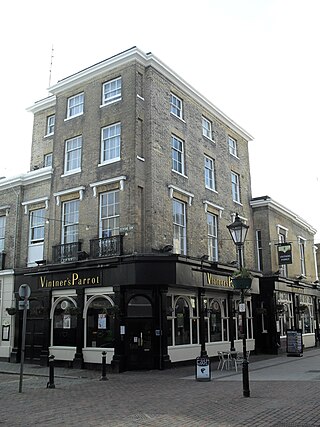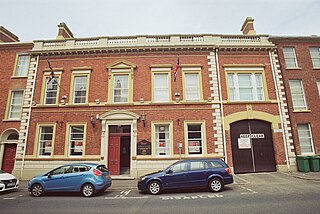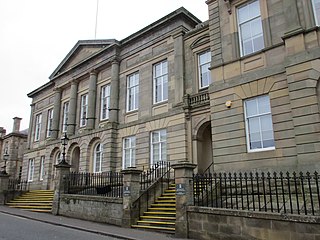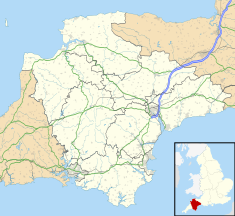
Ivybridge is a town and civil parish in the South Hams, in Devon, England. It lies about thirteen miles east of Plymouth. It is at the southern extremity of Dartmoor, a National Park of England and Wales and lies along the A38 "Devon Expressway" road. There are two electoral wards in Ivybridge East and Ivybridge West with a total population of 11,851.

South West Devon is a constituency represented in the House of Commons of the UK Parliament since 1997 by Sir Gary Streeter, a Conservative.

The Hazlitt Theatre and Exchange Studio, also known as the Hazlitt Arts Centre, is a theatre complex in Earl Street in Maidstone, Kent, England. The oldest part of the complex, which is now used as a shopping complex on the ground floor, and as a theatre venue known as the "Exchange Studio" on the first floor, is a Grade II listed building.

The Thieves' Kitchen is a pub in the centre of the town and borough of Worthing, West Sussex. Established as a public house in the late 20th century, it occupies two early 19th-century listed buildings in the oldest part of the town: a Greek Revival-style former wine merchants premises, and a Neoclassical chapel built for Wesleyan Methodists in 1839. The main part of the pub is in the wine merchants building facing Warwick Street, while the old chapel, facing Bedford Row, serves as its function room. Both buildings have been designated separately as Grade II Listed Buildings.

Elland Town Hall is a municipal building in Southgate, Elland, West Yorkshire, England. The structure, which was primarily used as an events venue, is a Grade II listed building.

The Queen's Hall, formerly Hexham Town Hall, is a municipal structure in Beaumont Street, Hexham, Northumberland, England. The structure, which was the headquarters of Hexham Urban District Council and is now an arts centre, is a Grade II listed building.

Okehampton Town Hall is a municipal building in Fore Street, Okehampton, Devon, England. The town hall, which is the meeting place of Okehampton Town Council, is a Grade II* listed building.

Seaton Town Hall was a municipal building in Fore Street, Seaton, Devon, England. The former Town Hall, which was the meeting place of Seaton Urban District Council, currently hosts The Gateway Theatre, providing live music, theatre, cultural and community events.

Chipping Norton Town Hall is a municipal building in the Market Place, Chipping Norton, Oxfordshire, England. The building, which is used as an events venue, is a Grade II* listed building.

The Old Town Hall is a former events venue in Prince of Wales Road, Cromer, Norfolk, England. The structure, which is currently used for retail purposes, is a grade II listed building.

Beeston Town Hall is a municipal building in Foster Avenue in Beeston, Nottinghamshire, England. The building was formerly the offices of Beeston and Stapleford Urban District Council and is now used by the Redeemer Church.

The Town House is a municipal building in Union Street in Yeovil, Somerset, England. The building, which is the meeting place of Yeovil Town Council, is a Grade II listed building.

Hanley Town Hall is a municipal building in Albion Square in Hanley, Staffordshire, England. The building, which is used as the local register office, is a Grade II listed building.

Brecon Guildhall, is a municipal building in the High Street, Brecon, Powys, Wales. The structure, which is the meeting place of Brecon Town Council, is a Grade II listed building.

The Old Town Hall is a municipal structure in Castle Street, Lisburn, County Antrim, Northern Ireland. The structure, which is used as a constituency office by the Democratic Unionist Party, is a Grade B2 listed building.

The Old Town House is a municipal building in the High Street in Old Aberdeen, Scotland. The structure, which is now the home of the King's Museum, is a Category A listed building.

Coldstream Town Hall is a municipal building in the High Street, Coldstream, Scottish Borders, Scotland. The structure, which currently accommodates a library and a registration office, is a Category B listed building.

Lanark Sheriff Court is a judicial building in Hope Street, Lanark, South Lanarkshire, Scotland. The building, which continues to serve as the local courthouse, is a Category B listed building.

Sunderland Town hall was a municipal building in the Fawcett Street in Sunderland, Tyne and Wear, England. It was the headquarters of Sunderland Borough Council until November 1970.

Prescot Town Hall is a municipal building in Warrington Road, Prescot, a town in Merseyside, England. The building is currently used as the offices and meeting place of Prescot Town Council.






















